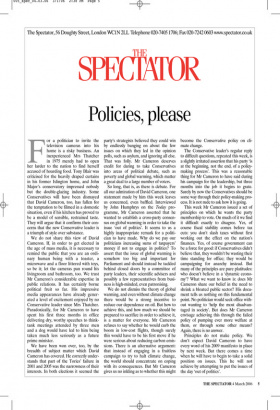Policies, please
For a politician to invite the television cameras into his home is a risky business. An inexperienced Mrs Thatcher in 1975 merely had to open her larder to the nation to find herself accused of hoarding food. Tony Blair was criticised for the heavily draped curtains in his former Islington home, and John Major’s conservatory impressed nobody but the double-glazing industry. Some Conservatives will have been dismayed that David Cameron, too, has fallen for the temptation to be filmed in a domestic situation, even if his kitchen has proved to be a model of sensible, restrained taste. They will argue that it confirms their concerns that the new Conservative leader is a triumph of style over substance.
We do not share this view of David Cameron. If, in order to get elected in the age of mass media, it is necessary to remind the public that you are an ordinary human being with a toaster, a microwave and a floor littered with toys, so be it; let the cameras pan round his livingroom and bathroom, too. We trust Mr Cameron’s considerable expertise in public relations. It has certainly borne political fruit so far. His impressive media appearances have already generated a level of excitement enjoyed by no Conservative leader since Mrs Thatcher. Paradoxically, for Mr Cameron to have spent his first three months in office delivering dry, worthy speeches to thinktank meetings attended by three men and a dog would have led to him being taken much less seriously as a future prime minister.
We have been won over, too, by the breadth of subject matter which David Cameron has covered. He correctly understands that part of the Tories’ failure in 2001 and 2005 was the narrowness of their interests. In both elections it seemed the party’s strategists believed they could win by endlessly banging on about the few issues on which they led in the opinion polls, such as asylum, and ignoring all else. That was folly. Mr Cameron deserves credit for daring to take Conservatives into areas of political debate, such as poverty and global warming, which matter a great deal to a large number of voters.
So long, that is, as there is debate. For all our admiration of David Cameron, one statement made by him this week leaves us concerned, even baffled. Interviewed by John Humphrys on the Today programme, Mr Cameron asserted that he wanted to establish a cross-party consensus on global warming in order to take the issue ‘out of politics’. It seems to us a highly inappropriate remark for a politician to have made. Why do we pay our politicians increasing sums of taxpayers’ money if not to engage in politics? To assert that the issue of global warming is somehow too big and important for Parliament and should instead be tackled behind closed doors by a committee of party leaders, their scientific advisers and possibly a few representatives from business is high-minded, even patronising.
We do not dismiss the theory of global warming, and even without climate change there would be a strong incentive to reduce our dependence on oil. But how to achieve this, and how much we should be prepared to sacrifice in order to achieve it, is a matter for everyone. Mr Cameron refuses to say whether he would curb the boom in low-cost flights, though surely this would have to be his first move if he were serious about reducing carbon emissions. There is an alternative argument: that instead of engaging in a fruitless campaign to try to halt climate change, the world should concentrate on coping with its consequences. But Mr Cameron gives us no inkling as to whether this might become the Conservative policy on climate change.
The Conservative leader’s regular reply to difficult questions, repeated this week, is a slightly irritated assertion that his party ‘is at the beginning, not the end, of a policymaking process’. This was a reasonable thing for Mr Cameron to have said during his campaign for the leadership, but three months into the job it begins to grate. Surely by now the Conservatives should be some way through their policy-making process. It is not rude to ask how it is going.
This week Mr Cameron issued a set of principles on which he wants the party membership to vote. On much of it we find it difficult exactly to disagree. Yes, of course fiscal stability comes before tax cuts: you don’t slash taxes without first working out the effect on the nation’s finances. Yes, of course government can be a force for good: if Conservatives didn’t believe that, they wouldn’t be wasting their time standing for office; they would be campaigning for anarchy instead. But many of the principles are pure platitudes: who doesn’t believe in a ‘dynamic economy’? What we want to know is: does Mr Cameron share our belief in the need to shrink a bloated public sector? His document tells us nothing on this fundamental point. No politician would seek office without wanting to ‘help the most disadvantaged in society’. But does Mr Cameron envisage achieving this through the failed policy of pumping ever more welfare at them, or through some other means? Again, there is no answer.
Principles do not make policy. We don’t expect David Cameron to have every word of his 2009 manifesto in place by next week. But there comes a time when he will have to begin to take a solid position on issues. This he will not achieve by attempting to put the issues of the day ‘out of politics’.










































































 Previous page
Previous page